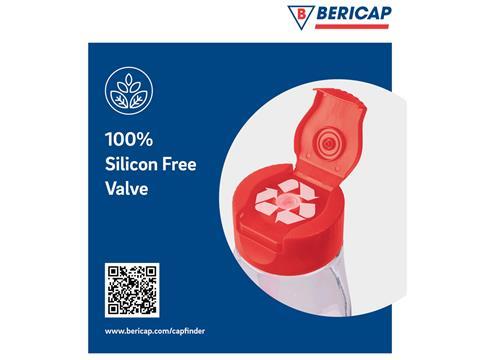
The winner of this year’s Sustainability Award for best Recyclable Packaging was BERICAP, with their 100% silicone-free BERICAPValve. We talked with Pavlina Zabloudilova, Senior Manager Communication and Marketing, about the environmental benefits of this solution.
PE: Firstly, congratulations on winning the award! What does this mean for your company?
PZ: Besides continuously striving for innovative closure solutions, we often also experience that seemingly small changes with no negative effect on the quality or durability of our products have great effects in terms of processing, convenience and sustainability. Whereas it goes without saying that using and mastering TPE material instead of silicone for a valve closure meant a new product with significant changes and investments.
It is therefore great to see that the big sustainability impact behind the small visible change has been recognized and rewarded. Thanks again to the Jury – this award pushes our motivation to further keep on looking also for the small changes with the big impacts.
PE: Could you please introduce your successful entry and what’s innovative about it?
PZ: BERICAP introduced the BERICAPValve which is made from TPE and represents a 100% silicone-free valve. Closures with the TPE valve are convenient to use and offer controlled dispensing. The orifice stays clean after every squeeze. The BERICAPValve is available in various sizes, cut profiles and shore hardness levels, allowing it to meet the requirements of a broad spectrum of packaging types and product formulations.
The TPE BERICAPvalve is also suitable for the new lightweight BERICAP HC EV 29/23, which represents innovation for the food segment by satisfying today’s eco-design requirements of material usage and recyclability.
PE: What are the environmental challenges in packaging that your entry addresses, and what impact do you hope it will make?
PZ: One of the processes of plastic recycling is the separation of PP/TPE materials from PET materials using a water bath. Whereas PP/TPE float to the top, PET sinks to the bottom where it is collected and reintroduced into the PET recycling stream. The traditional materials of valves that are commonly used also sink to the bottom and contaminate the valuable PET recyclate. The BERICAPValve floats in water, enabling a perfect separation, and is recycled in the PP/TPE material stream.
PE: ‘Sustainability’ in packaging is multi-dimensional – both in terms of objectives and challenges. Could you comment on the most important roadblocks you identify from your position in the value chain, and the kinds of solutions you would like to see addressing them?
PZ: As the BERICAP Group, we are committed to doing our business in an environmentally friendly and sustainable manner. Our goal is to optimize the use of non-renewable natural resources, energy and water, to avoid the use of hazardous chemicals wherever possible and at the same time to encourage our suppliers to do the same.
Looking at PET material specifically, today’s recycling technology already allows a true circularity with significant advantages in CO2 impact vs alternative materials.
The main roadblocks are the availability and price of rPET vs virgin material, which are mainly driven by economies of scale.
The basis for any scaling is the volume and there the main roadblocks in many countries are still low collection rates (lack of motivating concepts, e.g. DRS) and the capacity constraints of the recycling industry.












